JUNE/JULY NEWSLETTER AND SOME MUSINGS ON THE WRITING LIFE
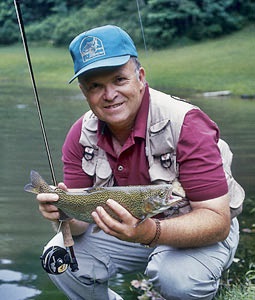
Once again I’ve somehow managed to miss a month and find myself playing catch-up. Mind you, it’s not that I’ve been shamefully idle. Honesty compels me to admit that maybe, on the writing front as well as others, to borrow words from a longtime friend and fellow hillbilly, I “ain’t as catty as I used to be.” Still, there isn’t a day goes by that I don’t manage at least to try to get some words committed to the guts of a computer that manages to provide me with mixed emotions of wonder, woe, and a feeling of technological inadequacy. In fact, I’m down to the last chapter of the book on mountain characters I’ve been working on for years. It carries the tentative title “Portals of Paradise: Profiles of Mountain Characters.” Once I wrap up the final chapter and do a lot of proofing and revising, I’ll commit the finished product to the uncertain mercies of a publisher.
Meanwhile, my laggardly ways and some gentle, gracious inquiries from some of you as to when another newsletter might be forthcoming, leads to the subject of why I even write these newsletters. First of all, let me assure you that it isn’t for monetary reasons. Sure, I try to promote my books and offer special pricing on them frequently. But if you measure hours spent against financial return, I’d be better off flipping burgers or working at a counter in some fast food place. There are multiple reasons for the newsletter. Like most serious writers of my acquaintance, along with a lot of far more accomplished and renowned ones whose works, including autobiographies, I have read, literary endeavor is pretty much a compulsion. You are driven to do it and somehow feel empty when not writing.
Another key factor, and for me at least it is of vital importance, is a sense of accomplishment. I don’t necessarily “like” to write, but I most certainly like to have written. A finished product appearing in print is something that still brings me joy after the passage of more than four decades, the publication of a substantial number of books, and seeing perhaps 5,000 newspaper and magazine pieces into print. Maybe most compelling of all though, and this goes to the heart of much of the type of writing I do, is a desire to share memories. Or maybe a better way to put it is that I constantly hope that my recalling personal memories serves to remind readers that they too ought to remember. Maybe I can’t be everybody’s memory, but at least I can aspire to be someone who reminds others of the importance of memories. The wonderful Canadian singer and songwriter, Ian Tyson, put it quite nicely in a song he wrote, “The Gift,” which looks at the magical abilities of artist and literary figure Charlie Russell. Lyrics in the song suggest that Russell felt a compulsion: “Get her all down before she goes. You gotta get her all down, ‘cause she’s bound to go.”
That pretty well summarizes my thoughts. I want to get things down before I’m gone and before those folkways, proud people, interesting events, foodways, and other things I have known and experienced are gone for good. Maybe I wallow in nostalgia, but after all my first career was that of an academic historian. If there is anything we should learn from history, it is that we can’t know where we are going if we don’t know where we’ve been. I want to record where I’ve been, the traditions I’ve shared, and the people and ways I’ve known. I just have to hope that through doing so they will be passed along to and appreciated by younger folks and future generations. That’s why I write, and that also in large measure explains this newsletter.
Recently lyrics from one of many songs from the Statler Brothers that I thoroughly enjoy have been running through my mind. I don’t know about others, but lyrics almost constantly assault my mind, and they are always of tunes I enjoy. The song from the Statler Brothers is “Carry Me Back,” and the lyrics perfectly fit my mood. I’ve always been passing fond of the group. We are (or in the case of the late Harold Reid, who sang bass, were) much of an age, and the times and things which loom large in their songs forge a common bond. Like me, they are sons of the Southern Appalachian soil (Staunton, Virginia), and we share small town roots, values, and memories. An additional link is that a man who was part of the group for a short time at their beginning, the late Garvey Winegar, was a personal friend and a talented outdoor writer.
A review he wrote for the Richmond Times Dispatch covering The Complete Venison Cookbook when it first came out resulted in a bigger short-time selling spree than on anything I’ve ever written. Incidentally, it is this month’s books special (see details below). Then there is the fact that the group’s music has gospel origins similar to the sort of music making which was a Friday night fixture during the late 1950s in the area of the Smokies where I grew up. I love the Statler Brothers’ exquisite harmony, the nice blend of humor and nostalgia which characterizes so many of their songs, and most of all the fact that they sing about things with which I readily identify.
That holds ever truer with each passing year, and brings us to the lyrics of “Carry Me Back.”
Carry me back and make me feel at home.
Let me cling to those memories that won’t let me alone.
When it was always summer and she was always kind.
Carry me back Lord, while I still got the time.
The song also mentions fading memories of a teenage girlfriend who likely would, to this day, remember 1959. I do. Then Bryson City had its equivalent of the song’s “Hamburger Dan’s.” The local hamburger joint was known as Naber’s (a corruption of “Neighbor’s”), and until closing a couple of years ago, ostensibly for renovations, it still made wonderful burgers. Driving around town or going to the drive-in were standard summertime activities, and preachers did visit poor souls when they got down (and thankfully, still do).
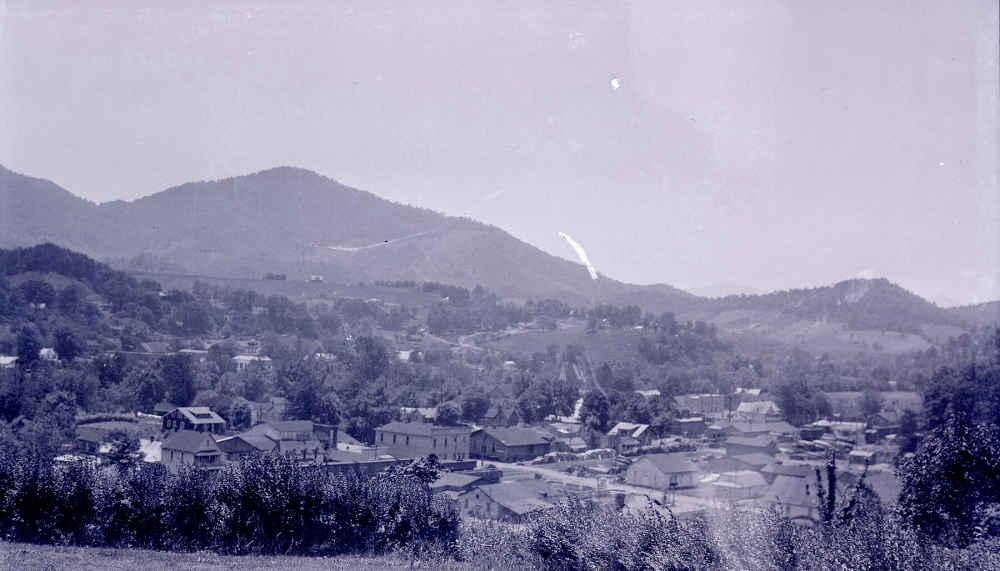
View from Hospital Hill shows Bryson City Photographer: “Doc” Kelly Bennett (1890-1974) courtesy of WCU’s Southern Appalachian Digital Collections
Such things were part and parcel of growing up in a rural, small town setting, and even with age and reality tell me all too clearly that it isn’t “always summer,” time isn’t always kind, and those halcyon days of youth are forever gone, fond memories remain strong. Thankfully as well, there are some things that haven’t changed all that much The population of Bryson City, N. C., where I grew up, was less than 2,000 in the 1960 census, the year I went off to college and in effect took the first meaningful steps towards being on my own. Today the population is just over 1,500, and while things have changed in a lot of ways (and in my view mostly not in a positive direction), this little mountain town remains a place where a sound work ethic, honesty, faith, and patriotism figure prominently in daily life for many though by no means all local residents.
The mid-summer memories I cling to are many and varied, but without exception they are warm, winsome ones. Life in a small town setting has a lot to recommend it, and from a personal perspective I’m eternally grateful that I grew up in a place where I could walk out the back door and go hunting, where scads of adults were wonderful to me and also served as guideposts, and where I went to schools where teachers really cared. I may not have taken anything approaching full advantage of what those teachers offered, but that’s all on me.
Books were a constant and welcome companion throughout my youth, but in the summer months they were reserved for rainy days and evenings. There was simply too much to do outdoors the rest of the time. Seldom did a day pass when I didn’t put in three or four hours either in a local trout stream or on the banks of the Tuckasegee River, where catfish were my primary quarry. I ran trot lines and throw lines in the river, occasionally sold some catfish, and spent a world of time with an old river rat named Al Dorsey. Later I would learn that old Al, who was a stranger to soap and warm water but a catfishing wizard, had spent upwards of a decade in the state pen following a conviction for second-degree murder. As I knew him though, he was just a smelly old codger, one among many local characters who were part and parcel of my boyhood.
I got to know several other intriguing characters thanks to spending idle hours at a shady spot near the town square where old men played checkers, swapped lies, and trade knives. The gathering site had two names, both of them grand examples of the pithy, to-the-point way mountain folks tend to talk. The polite name for the place was “Loafer’s Glory,” but another off-color term was used more frequently. This was “Dead Pecker Corner,” a humorous reference to the age and declining sexual interest and/or prowess of the old-timers who were regulars there.
That self-same square was also frequented on Saturdays during the summer by various persuasions of Bible thumpers. Some of these street preachers, with their powerful voices and verbal depictions of hell-fired and damnation, could draw quite a crowd. Others garnered scant attention but preached on bravely nonetheless. Often I would stop to listen to them a bit, not so much for the message as for the show.
Religion had other summertime faces as well. There was a tent revival about every other week, and often part of the event would be some exceptional gospel singing. Similarly, once or twice a summer there would be sort of offshoots of the traditional brush arbor revivals, with an entire Saturday being devoted to preaching, singing, and dinner on the grounds. Later, a few years after I had gone off to college, a local gospel group which attained international renown, The Inspirations, would turn this into an annual event known as “Singing in the Smokies.” The original members of the group were just local guys to me—Archie Watkins, the tenor, was the son of the school custodian, and I dated one of his sisters for a time; Martin Cook had been a high school teacher; while the other original members, Jack Laws, Ronnie Hutchins, and Troy Burns; were all simple sons of the Smokies who made a prominent place for themselves in the world of gospel music. Best of all, there was the black church within hearing distance of my boyhood home, and when those folks had a revival, with all the windows open and fans aflutter in every hand, the music to be heard was pure glory. Many was the time I would sit outside as the evening air gradually cooled and listen to those wonderful sounds blend with the chorus of katydids in full song.
Most of the time when I listened to street preachers it was after having attended the Saturday matinee at the local movie theater. For a thin dime (later inflation took the price to 12 and then 15 cents) you got the latest installment of a serial, a cartoon, a news reel, and a Western featuring the likes of Johnny Mack Brown, Lash LaRue, Roy Rogers, or Gene Autry. In July I was usually flush with money, thanks to the fact that blackberries peaked in ripeness around Independence Day and also because I caddied on the local golf course, mowed lawns, caught and sold night crawlers and spring lizards to bait stores, and earned pocket money in various other ways.
Later on, in my mid- and late teens, I would hold a full-time job. That included working at the golf course—mowing the fairways with reel-type gang mowers pulled by a tractor dating from the 1930s which had to be started by hand cranking, mowing the rough with a side blade, and dragging the sand greens (a contrast in terms, because they were brown, not green), and generally running things at the little nine-hole course. That brought in as much as five dollars a day, and I reckoned I was in high cotton, never mind that my typical work day was 10 or 11 hours.
Mostly though, “those memories that won’t leave me alone” are about ordinary things which somehow, with the passage of time, have turned extraordinary. Here’s a sampling, and if you are as blessed as I have been, you will share many of them and have others of your own to add to the list.
*The first really big trout I caught—I still have a grainy black-and-white picture of it Momma insisted on taking, and for that as so many other simple but singularly meaningful things I owe her a lasting debt of gratitude.
*My first trout on a fly, which I ate with a special sort of “putting meat on the table” sense of satisfaction that no trout before or since has ever provided. Incidentally, I’ve always been more of the “release to grease” or “hook to cook” persuasion than of a catch-and-release bent. When I was a youngster, both fish and game were welcome additions to the family diet.
*Night fishing in the stream, Deep Creek, where I cut my angling teeth. This was always done after a heavy rain raised the creek level and left it muddy. I now know that night fishing for trout there was illegal (it never crossed our minds), although mostly we caught red horse, suckers, and redeyes, not trout.
*Flirting with tourist girls spending a few days in the mountains.
*Taking perverse joy in giving a flatlander “Floridiot” (what Floridians were called, behind their back) directions to the Park which were inaccurate and would lead them to the dead end of what was known as the “New Road” and later became “The Road to Nowhere” because it was never finished. This was admittedly mean, but when folks asked questions like “Where do we see the bears?,” “Do they really make moonshine here?,” or “Are there wild Indians on the Cherokee Reservation?”, the temptation to pull some city slickers’ strings was irresistible.
*Watching the sun set, seemingly downhill, from Clingmans Dome.
*Backpacking into a remote campsite in the Smokies and catching scores of trout every day while never seeing another soul except the buddies with whom I was camping.
*Playing fast pitch softball on warm evenings under the lights and being warmed in a different way by thoughts of your girl friend sitting in the bleachers watching the game.
*Feeling that a 20-cent milkshake and a 25-cent hamburger with all the trimmings were the finest fare imaginable.
*Going to square dances on Saturday nights and kicking up one’s heels to classic dancin’ tunes such as “Down Yonder” and “Under the Double Eagle.”
*Looking at the new fall edition of the Sears & Roebuck catalog, which always showed up about mid-July, and picking out one or two items which I hoped Mom would order as part of my wardrobe for the new school year.
*Eating corn-on-the-cob to my heart’s content, and that usually meant a minimum of three ears of Hickory Cane or four of the smaller “sweet” corn.
*Spending several days with my older cousins who lived all of six miles away in the little crossroads of Whittier, but to me it seemed like another world.
*Practicing marksmanship for hours on end with a slingshot I had made (with some expert assistance from Grandpa Joe).
*Skipping rocks in the river in hotly contested competitions with other boys to see who could get the most skips.
*Riding my bike back and forth across traffic counters hundreds of times. I have no idea whether a boy on a bike was sufficient to record on the clicker, but if so, state transportation folks must have pondered mightily on how a little side road could have so much traffic.
*Picking blackberries and enjoying the fruit of my labors in the form of goodness straight from nature’s rich larder (see recipes below).
*Having my heart broken half a dozen times in those stumbling, sensitive times of teenage romance. All fairness compels me to add that when things went awry it was almost always my fault.
*Enjoying an icy slice of watermelon with Grandpa Joe after a long, hot session of garden work, then listen to him chuckle at my efforts to become a master of seed spitting. Incidentally, that particular memory makes me wonder what ever happened to the giant green, round watermelons we knew as Georgia “cannon balls” and to lament the passing of other melons, such as Charleston Greys, which had plenty of seeds for spitting.
*Riding truck inner tubes in the creek while scanning overhanging limbs for water snakes (not a problem) and hornets’ nests (a major problem if you disturbed a nest).
All these memories, and many more, course through my mind, and with increasing frequency, as I become ever longer in the tooth and sparser (and greyer) in the hackle. Still, as “Carry Me Back” from the Statler Brothers suggests, they “make me feel at home” and I’m glad to share them “while I’ve still got the time.”
SPECIAL BOOK OFFER
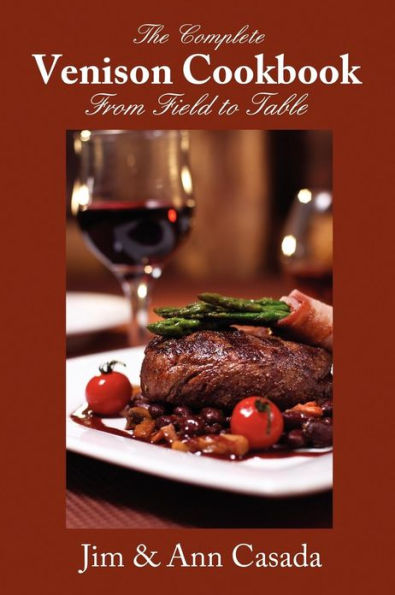
This issue’s special book offer is for a copy of The Complete Venison Cookbook. As I noted above, sales of the work when it first appeared far exceeded the norm in my experience. The cookbook came out at an ideal time for the Christmas market, and simply getting orders processed, packaged, and carried to the post office occupied about every hour of the day for weeks. Right now is an ideal time to be emptying freezers of venison from last season in anticipation of more come fall, and I can assure you that the 200 or so recipes in the work are ones my late wife and I personally cooked, tasted, and gave our seal of approval. Signed and inscribed copies are $15 postpaid and can be ordered through my website (www.jimcasadaoutdoors.com) or by sending payment to me c/o 1250 Yorkdale Drive, Rock Hill, SC 29730.
RECIPES
QUICHE WITH POTATO CRUST

I’ve always been a fan of quiche, something mountain folks from the place of my raising sometimes describe as an “egg pie.” In essence, that what quiche is, although more often than not the dish is fancied up with the addition of things such as spinach, cheese, tomato, asparagus, onion, or bacon to the whipped egg mixture before it goes into the oven to bake. Recently I tried a bit of a different approach to making quiche, and the result was delightful. Instead of a pastry crust I used potatoes. I sliced them super thin with an ulu (you could also use a mandoline), so thin they appeared translucent. Then I carefully arranged the potato slices in the bottom and around the sides of a deep dish baking pan lightly greased with olive oil. I use a circular glass dish in order to get the pie shape, but square or rectangular pans will work fine. I made sure the slices overlapped so there were no “holes” where the egg mixture could flow through and, in effect, “go under” like some types of custard pies are wont to do. I baked the crust in a preheated oven at 400 degrees for 15 minutes and then took it out of and added my egg mixture, which had been thoroughly whipped while the potato crust baked. Then the dish was put back in the oven, with the temperature reduced to 350 degrees. Cook for 30 minutes or until the pie is fully firm and “set.” Here are the basic ingredients.
Enough peeled and sliced potatoes to provide a crust. Put them in a large bowl and drizzle with just enough olive oil to coat the slices. Dust with salt and pepper and mix by hand or with a spoon to be sure all the slices are coated.
5 large eggs
1 cup milk, half and half, or whipping cream (what you use will depend on taste, but cream makes a fluffier, richer quiche)
Bacon pieces if you like
Grated cheese (I like extra sharp cheddar)
Vegetables of your choice such as sautéed onion, pre-cooked asparagus, or broccoli (don’t hesitate to experiment with other veggies)
BLACKBERRY SAUCE
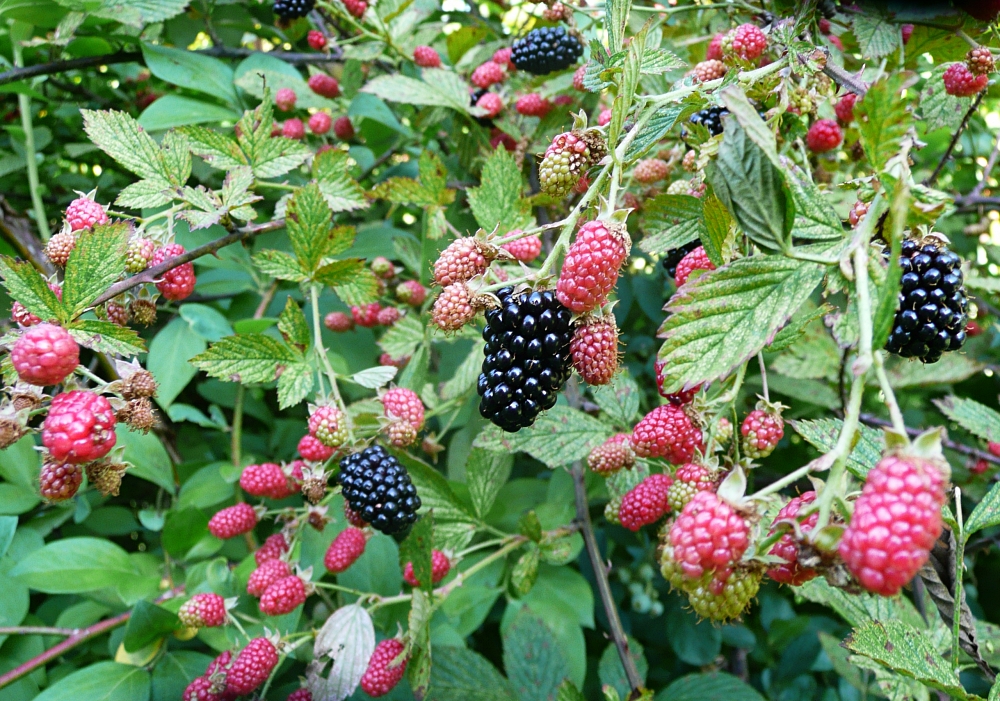
2 cups blackberries
½ to ¾ cup sugar
1 tablespoon fresh lemon juice
Mix all the ingredients well and refrigerate for an hour or more. Allow sauce to come to room temperature before serving. Delicious served over a chocolate tart, cheesecake, or vanilla ice cream.
BLACKBERRY DUMPLINGS
1 quart blackberries
1 cup of sugar (or to taste)
Enough water to make berries thin enough to cook dumplings
DUMPLINGS
1 cup flour
2 teaspoons baking powder
¼ teaspoon salt
1 tablespoon sugar
1 cup milk
Place blackberries, sugar and water in saucepan and bring to a boil. Meanwhile, mix dumpling ingredients thoroughly and drop by tablespoons into boiling berries. Cook for 15 minutes or until dumplings are cooked through the center. Serve hot with cream.
BLACKBERRY SORBET
2 ½ cups boiling water
1 regular size tea bag
3 cups fresh blackberries
1 ¼ cups sugar
¼ cup freshly squeezed lemon juice (about 1 ½ lemons)
Pour boiling water over tea bag and steep for 10 minutes. Mix blackberries with sugar. Add tea to the berries; crush berries with the back of a large spoon to release juices. Cover and cool. Puree berry/tea mixture in food processor using a metal blade. Strain through a fine sieve. Add lemon juice and mix. Refrigerate for at least an hour. Place sorbet mixture in ice cream maker and process as you would ice cream. Freeze sorbet overnight to allow flavors to develop. Makes one quart (recipe ingredients can be doubled to make more).
EASY BBQ RIBS
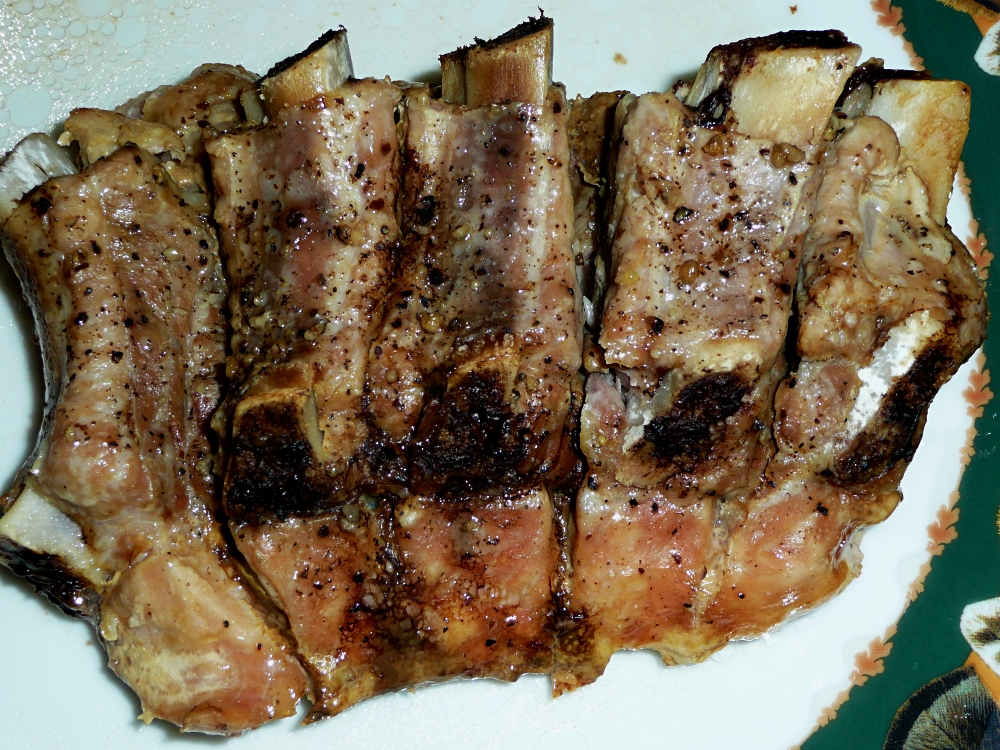
Serving of pork ribs ready for BBQ sauce
In recent weeks it has simply been too hot, come supper time, to be outside laboring over a hot grill with air temperatures in the 90s and the humidity at terrible levels. Yet I love ribs, and if you buy a full rack, or even two (i. e., all that’s available from a single hog), you have the makings of a bunch of tasty and relatively inexpensive meals. If you doubt me, just compare the price of this basic cut of pork with even cheaper offerings of beef such as ground meat. My answer is to cook ribs in the oven, and it’s the essence of simplicity. Just take a section of ribs suitable for your needs (four ribs per person makes a hefty serving) and slice halfway through between each rib. Rub in salt and black pepper, wrap in aluminum foil, being sure the meat is encapsulated so the juice doesn’t escape, place on some kind of cooking sheet that will capture any overflow juice, and bake at 275 degrees for three hours. Then peel back to foil and broil just long enough (it shouldn’t take more than 10 minutes) to “crust” the top of the ribs. They will be fall off the bone tender—and juicy. Adorn with your favorite BBQ sauce, or better still, make your own. Ribs go well with slaw, fresh tomatoes, or potato salad.